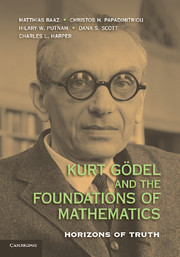Book contents
- Frontmatter
- Contents
- Contributors
- Foreword
- Preface
- Acknowledgments
- Short Biography of Kurt Gödel
- I Historical Context: Gödel's Contributions and Accomplishments
- Gödel's Legacy: A Historical Perspective
- The Past and Future of Computation
- Gödelian Cosmology
- II A Wider Vision: The Interdisciplinary, Philosophical, and Theological Implications of Gödel's Work
- 11 Gödel and Physics
- 12 Gödel, Thomas Aquinas, and the Unknowability of God
- Gödel and the Mathematics of Philosophy
- Gödel and Philosophical Theology
- Gödel and the Human Mind
- III New Frontiers: Beyond Gödel's Work in Mathematics and Symbolic Logic
- The Realm of Set Theory
- Gödel and the Higher Infinite
- Gödel and Computer Science
- Index
12 - Gödel, Thomas Aquinas, and the Unknowability of God
Published online by Cambridge University Press: 07 September 2011
- Frontmatter
- Contents
- Contributors
- Foreword
- Preface
- Acknowledgments
- Short Biography of Kurt Gödel
- I Historical Context: Gödel's Contributions and Accomplishments
- Gödel's Legacy: A Historical Perspective
- The Past and Future of Computation
- Gödelian Cosmology
- II A Wider Vision: The Interdisciplinary, Philosophical, and Theological Implications of Gödel's Work
- 11 Gödel and Physics
- 12 Gödel, Thomas Aquinas, and the Unknowability of God
- Gödel and the Mathematics of Philosophy
- Gödel and Philosophical Theology
- Gödel and the Human Mind
- III New Frontiers: Beyond Gödel's Work in Mathematics and Symbolic Logic
- The Realm of Set Theory
- Gödel and the Higher Infinite
- Gödel and Computer Science
- Index
Summary
Incompleteness, Arithmetical and Theological
The invitation to discuss issues of “indeterminacy” and “unknowability” across so diverse a range of interests as that represented at the 2006 “Horizons of Truth” conference at the University of Vienna, and then to contribute a chapter to this volume, was, for me, a jobbing student of medieval theology, far too good an opportunity to turn down. I should perhaps explain why, briefly and in personal terms. Although a philosopher by background and training, my principal academic interests have for some years now been in the study of forms of medieval Christian theology, wherein can be found a cluster of notions of what might be called “systematic indeterminacy,” or perhaps better, “demonstrable unknowability,” and perhaps most relevantly to the purposes of this chapter, systematic and “demonstrable incompleteness.” These are notions that bear teasingly like-sounding analogies with parallel notions today in philosophy, mathematics, natural science, and literary theory, and although by long-acquired academic instinct, I am skeptical of grand theory purporting to link intellectual traditions across epochs, even within historically continuous disciplines, let alone between very diverse disciplines to boot, those like-sounding analogies do have a capacity to tease intellectually. For as with flirts, such analogies as often evade the advances they elicit; evasions notwithstanding, though, they still exert their power to attract.
- Type
- Chapter
- Information
- Kurt Gödel and the Foundations of MathematicsHorizons of Truth, pp. 277 - 296Publisher: Cambridge University PressPrint publication year: 2011
- 1
- Cited by



